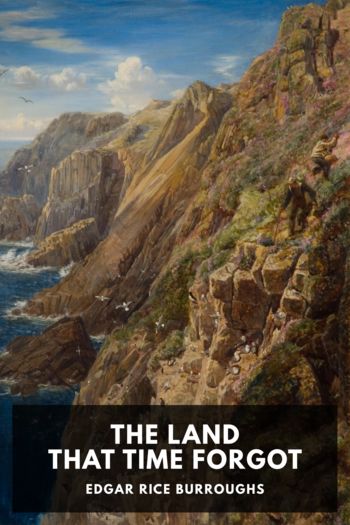South!, Ernest Shackleton [good books to read in english TXT] 📗

- Author: Ernest Shackleton
Book online «South!, Ernest Shackleton [good books to read in english TXT] 📗». Author Ernest Shackleton
The three boats were a mile away from our floe home at 2 p.m. We had made our way through the channels and had entered the big pool when we saw a rush of foam-clad water and tossing ice approaching us, like the tidal bore of a river. The pack was being impelled to the east by a tide-rip, and two huge masses of ice were driving down upon us on converging courses. The James Caird was leading. Starboarding the helm and bending strongly to the oars, we managed to get clear. The two other boats followed us, though from their position astern at first they had not realized the immediate danger. The Stancomb Wills was the last boat and she was very nearly caught, but by great exertion she was kept just ahead of the driving ice. It was an unusual and startling experience. The effect of tidal action on ice is not often as marked as it was that day. The advancing ice, accompanied by a large wave, appeared to be travelling at about three knots; and if we had not succeeded in pulling clear we would certainly have been swamped.
We pulled hard for an hour to windward of the berg that lay in the open water. The swell was crashing on its perpendicular sides and throwing spray to a height of sixty feet. Evidently there was an ice-foot at the east end, for the swell broke before it reached the berg-face and flung its white spray on to the blue ice-wall. We might have paused to have admired the spectacle under other conditions; but night was coming on apace, and we needed a camping-place. As we steered northwest, still amid the ice-floes, the Dudley Docker got jammed between two masses while attempting to make a shortcut. The old adage about a shortcut being the longest way round is often as true in the Antarctic as it is in the peaceful countryside. The James Caird got a line aboard the Dudley Docker, and after some hauling the boat was brought clear of the ice again. We hastened forward in the twilight in search of a flat, old floe, and presently found a fairly large piece rocking in the swell. It was not an ideal camping-place by any means, but darkness had overtaken us. We hauled the boats up, and by 8 p.m. had the tents pitched and the blubber-stove burning cheerily. Soon all hands were well fed and happy in their tents, and snatches of song came to me as I wrote up my log.
Some intangible feeling of uneasiness made me leave my tent about 11 p.m. that night and glance around the quiet camp. The stars between the snow-flurries showed that the floe had swung round and was end on to the swell, a position exposing it to sudden strains. I started to walk across the floe in order to warn the watchman to look carefully for cracks, and as I was passing the men’s tent the floe lifted on the crest of a swell and cracked right under my feet. The men were in one of the dome-shaped tents, and it began to stretch apart as the ice opened. A muffled sound, suggestive of suffocation, came from beneath the stretching tent. I rushed forward, helped some emerging men from under the canvas, and called out, “Are you all right?”
“There are two in the water,” somebody answered. The crack had widened to about four feet, and as I threw myself down at the edge, I saw a whitish object floating in the water. It was a sleeping-bag with a man inside. I was able to grasp it, and with a heave lifted man and bag on to the floe. A few seconds later the ice-edges came together again with tremendous force. Fortunately, there had been but one man in the water, or the incident might have been a tragedy. The rescued bag contained Holness, who was wet down to the waist but otherwise unscathed. The crack was now opening again. The James Caird and my tent were on one side of the opening and the remaining two boats and the rest of the camp on the other side. With two or three men to help me I struck my tent; then all hands manned the painter and rushed the James Caird across the opening crack. We held to the rope while, one by one, the men left on our side of the floe jumped the channel or scrambled over by means of the boat. Finally I was left alone. The night had swallowed all the others and the rapid movement of the ice forced me to let go the painter. For a moment I felt that my piece of rocking floe was the loneliest place in the world. Peering into the darkness; I could





Comments (0)